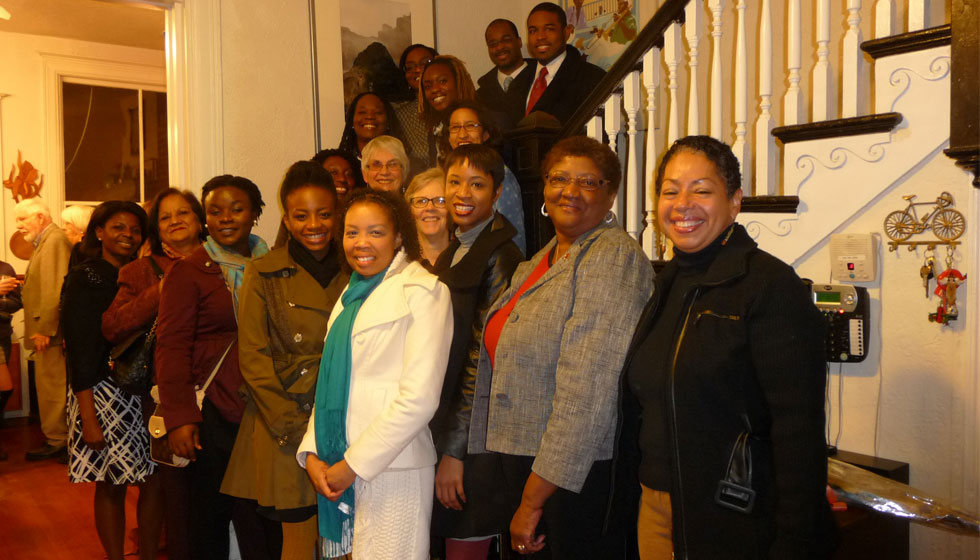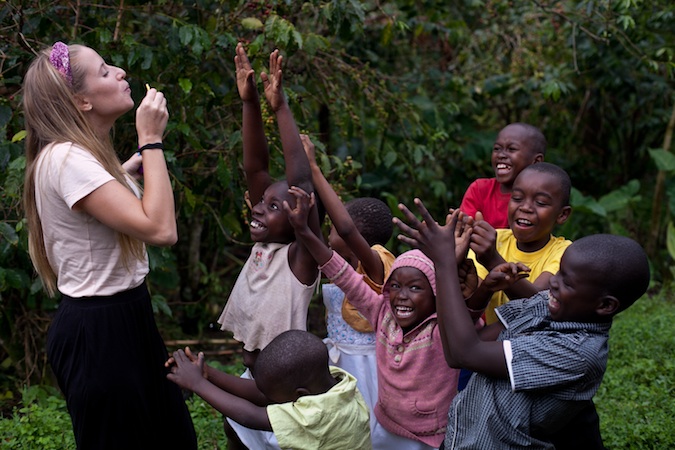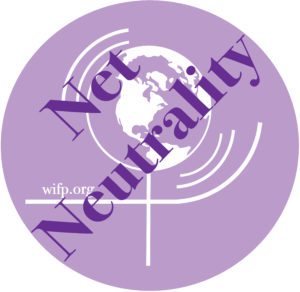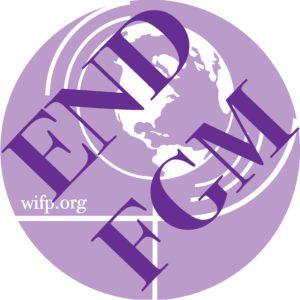WIFP Hosts Leading Scholar/Activist on FGM: Tobe Levin, Ph.D.
On April 6, the Women’s Institute for Freedom of the Press (WIFP) hosted an event to raise awareness and encourage activism surrounding the issue of Female Genital Mutilation (FGM).
Dr. Tobe Levin’s fascinating presentation covered historical efforts in diverse areas of the world to control women’s bodies, putting FGM in a global context. Her forty-minute lecture, accompanied by her PowerPoint slides, kept her packed audience engaged. The issue of FGM is more known in other countries than in the U.S. and awareness has led to increased efforts to eradicate the harm inflicted on girls.
Levin discussed the forms of FGM, areas of the world where it is practiced and activists who are speaking out for its worldwide abolition. She highlighted the work of Khady, a Senegalese woman who was responsible for the passage of the UN Resolution against FGM. Levin translated Khady’s book into English and published her fascinating life story. (http://uncutvoices.com/blood-stains-a-child-of-africa-reclaims-her-human-rights.html)
Founder/CEO of UnCUT/VOICES Press, a press devoted to the publication of works on FGM, Levin is also an Associate at the W. E. B. DuBois Institute of the Hutchins Center at Harvard University, as well as a lecturer at the University of Frankfurt. She will soon be visiting professor at Oxford University.
Nora Bertognotti, visual artist, journalist and Workshop Art Educator, presented Tobe Levin with one hundred beautifully designed note cards (and matching envelopes). The cards feature a watercolor piece with a slogan on the front that reads, “125 million girls and women mutilated, 125 million spirits annihilated” and a poem on the back ~ designed and written specifically for the cause of FGM. We share the poem “Yet She is Still Wounded…”
She moves her lips
and only a painful
silence emanates.
Her young girl eyes weep.
She takes a glance
at her scars…
her heart hurts, her soul has gone.
Her silence is now a mournful sound.
She tries to soothe the wound
She strives to reclaim herself
She attempts to hold the power to heal.
Yet she is still wounded…
The artist, Bertognotti, who makes generous artistic donations to causes, was honored by CURE Magazine in 2008 as the recipient of the Extraordinary Healer Award. She is the originator of Soul and Heart Cards (soulandheartcards.com). Those of us gathered found the talent, generosity, and humility of Nora Bertognotti most inspiring. The cards were donated to raise awareness and generate funding for advocacy.
The event culminated in the presentation to her of the WIFP “Women and Media Award” in recognition her outstanding work in media. Levin has been working for decades on getting information out about FGM and encouraging activism.

Dr. Elana Anderson, WIFP Associate Director, presented Dr. Tobe Levin WIFP’s Award
We are proud that Tobe Levin is an Associate of WIFP and has provided us a way to take more steps toward the eradication of FGM. The future possibilities of work on this topic, generated at the event, include performance, poetry and increased dialogue.

WIFP Directors Elana Anderson and Martha Allen
Photos by Alethea Russell and Delma Webb
WIFP’s Book Launch Celebration

On November 22, 2013 we celebrated the release of the new book edited by WIFP Associate Dr. Carolyn Byerly, Howard University: The Palgrave International Handbook of Women and Journalism.
Additional presenters:
Dr. Gracie Lawson-Borders, dean, Howard School of Communications
Elisa Muñoz, director, International Women’s Media Foundation,
sponsor of book’s research
Dr. Maria Nghidinwa, World Bank, author of chapter on Namibia
Dr. Peter Kareithi, PennState Harrisburg, author of chapter on Kenya
She’s the First: International Day of the Girl Conference

by Alexandra Hatzakis, October 2013
This year, the non-profit organization She’s the First’s chapter at American University highlighted global women’s issues by holding its first annual conference in celebration of the International Day of the Girl on October 11, 2013. The conference was coordinated by Lorraine Magee, who works with She’s the First to provide support for young women in Africa who will be the first in their families to attend university. One interesting fact that Lorraine mentioned at the start of the conference is that the total cost of sending a girl to school in Uganda for an entire year is about $360, which is a relatively small amount when compared to the $14,000 per year that Massachusetts spends on each student in public school every single year.
With this in mind, the conference opened with a panel of women from organizations that are taking steps to educate young women in developing countries, in order to provide them with resources to better their own lives as well as the lives of everyone else within their communities. The panel included spokespeople from AGE Africa, Maasai Girls Education Fund, Batonga Foundation, and She’s the First at AU. During this panel, the women discussed the issues surrounding empowering women through education, the ability of education to lift people out of poverty, and the fact that in most developing nations it is not that men do not want to educate women, but rather that they simply cannot afford it. The work that each of these organizations does not only allow girls to receive an education on par with their male counterparts, it also brings attention to the fact that educating young girls in these societies is just as worthy an investment as educating boys. One of the themes of the conference that became apparent in while I listened to these women talk about their experiences in reaching out to educate young African women is the notion that empowering girls can lead to a higher standard of living, as young women who are given the opportunity to attain a postsecondary education are able to then reach out and enrich the lives of others. The panelists stressed that listening to what the people in the community want and educating men and boys about women’s issues is a hugely important part of the process of bringing knowledge to women in these communities.
The next two panels at the Day of the Girl DC conference discussed the closely-linked issues of gender-based violence and women’s health, featuring spokespersons from organizations such as My Sister’s Place, AU Women’s Initiative, Because I am a Girl, Plan International USA, Vital Voices, Reproductive Health Technologies Project, and Advocates for Youth. An important point made during the gender-based violence panel was about how necessary it is to not only provide resources, but also to empower girls by teaching them how to talk about abuse and to educate the community so that it can become a resource to victims of gender-based violence. A statement made by the spokesperson for My Sister’s Place had particular resonance; she said part of her work is asking a person what a healthy relationship looks like for them. It is not the same for everyone, but there are particular aspects of human relationships that are unhealthy no matter what the context of the situation, such as lack of trust and hyper-dependency. It is also important to stress that the patterns of abuse may look different in every relationship and to recognize heteronormativity and sexism in the way that we talk about and perceive abuse in relationships. The spokesperson for Vital Voices said that a huge part of preventing gender-based violence is female economic empowerment. When women have the resources and know-how to grow their own business, with the support of their partners, they are less likely to devalue themselves and be exposed to situations in which violence and abuse may occur. The panelists also agreed that the most important thing people can do when trying to find ways to be proactive is to educate themselves as much as possible and then not be afraid of being a resource to those around them. We also need to begin teaching young children as well as adults to identify and think about gender norms. Along with discussing what abuse looks like and how to talk about it, it is important to talk more about positive success stories and healthy relationships.
Part of being in a healthy relationship is having the resources to take charge of one’s reproductive health, and there were a number of interesting things said about this topic during the panel on Women’s Health. Panelists pointed out that much of the legislation being enacted regarding this area works to target low-income women, not only by preventing access to birth control and abortions, which are not insured by Medicaid, but also because of the deeply ingrained socio-economic disparity which prevents women from being able to support children they might want to have. Because programs funded by the United States, both abroad and domestically, are usually not allowed to offer abortions, more and more women are seeking out unsafe abortions, pointed out Madeline Barnett, a national campus organizer from the Feminist Majority Foundation. This is an issue that can only be fixed by creating pressure for cultural competency and women’s rights. Another part of salvaging this issue is taking an intersectional approach to power structures. For instance, men can help in many areas affecting women by being educated and proactive in women’s health issues. It is important to educate men because women are part of their families, and healthy women affect the way the family functions. A woman who is healthy will have more opportunities in general; this is why we need a grassroots effort to both educate and increase the availability of resources for physical and mental health amongst the poor. Reproductive health is not only a women’s issue. Everyone should care regardless of gender because everyone is affected by a woman’s ability to receive adequate health care and education. It is also important that women, and people in general, vote for policy makers who care about issues that affect women’s health and their access to resources that enable them to make their own choices about their bodies.
The panels that tied all of the above issues together for the day were about economic empowerment and political participation. One theme the economic empowerment panel focused on is the lack of gender diversity seen in many workplaces. The key hindrances to economic empowerment for young women outlined by Dr. Ben Gunter are lower education for girls, reproductive health issues, lower social status, violence against women, and various cultural constraints. Though strides have been made to improve women’s standing in the professional sector, some policies to encourage equality in the work environment have backfired, as employers would rather not hire women for whom they will have to pay maternity leave. Dr. Caren Grown pointed out that gender inequality is something that is inevitable in the current era; therefore, we have to improve women’s vocational education, to open up opportunities in growing sectors. Sybil Edwards of DC Web Women agreed with this point, stating that women need to be encouraged to pursue degrees in STEM as well as learning more about the tech field, which is currently lacking greatly in female representation. She also said that a great area for women to get involved, especially women of color, is app development. This is because Latino and African Americans are both the largest users of mobile technology and the most underserved, and very few women are involved in creating apps that would suit their needs. Barbara Wien, of the Peace & Collaborative Development Network, pointed out that a huge barrier to economic empowerment is the social hierarchy that perpetuates the cycle of violence. There are disproportionate amounts of money going to war making while poverty is undergoing feminization. Wien said that women are fed up with being wageworkers and looking to de-link from institutions and focus on cooperative entrepreneurship, in order to encourage the collective wellbeing and security of their communities. In sum, women are growing more and more eager to work with each other, and a large part of economically empowering women can be addressed by focusing on women’s health and education while taking steps to counter domestic violence and abuse.
The way this all tied together is the need for women to engage in not only grassroots political activism, but also to create systemic change by voting into power those who will focus on gender equality issues while challenging leaders who create policies that place extra burdens on women. Education, health, and the ability to achieve success in the professional sector are areas in which women still have great strides to make, especially when viewed from a global perspective. The way that each of the panelists addressed these issues brought attention to how closely intertwined they are–there cannot be change in one area without creating change in another. The main message I received from the conference is that together, by educating ourselves, working hard to empower and encourage young girls to become strong women, and by fighting the oppressive nature of current power structures while providing better resources to women, we can begin to ensure that those changes are positive.
 The Women’s Institute for Freedom of the Press
The Women’s Institute for Freedom of the Press









